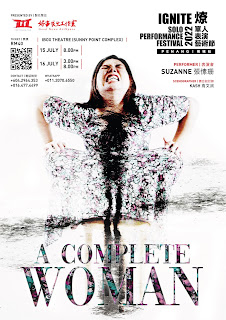I have been struggling about whether to write about this but the anger and the bitterness are taking up too much space in my head, so maybe if it's written down in some form or other it will go away and leave me alone. For now.
General life advice: never read the comments. Never, ever read the comments.
Even if they're on a post in a Facebook group that is, ostensibly, meant for...discussion. But what you don't read won't hurt you. And what you don't see won't send you into incandescent rage.
ANYWAY, this post is basically a response to a specific thread in a specific group, but I figured it's also a somewhat writing-related post which may (or may not, whatever) be helpful to people trying to navigate this whole thing around inclusion and diversity in fiction. I have been stewing over this since 29 July, so it's obviously not something I am about to just let go. I do not want to actually respond in the thread lest I BLOW UP AND RAGE QUIT. (I kind of like the other stuff that happens in the group so I'm trying not to rage quit at this point. Also, the admins and the founders have been kind and diplomatic and civil so I may just end up blocking a couple of people instead.) I also do not have the mental energy for arguing; my preferred method for dealing with confrontation is to walk. away.
(But I am also passive-aggressive, hence this post.)
Note: It's been more than a week since I started writing this, the thread is quiet but reading it still leads to mild annoyance, so I suppose I will just finish the post.
---
This whole kerfuffle started because someone had the audacity to say that adaptations to literature that make it more inclusive are a good thing.
Which is, apparently, NOT the thing to say because all fantasy canon is holy and cannot be changed. (/s in case you weren't sure.)
Now, I'm not a very good fangirl. I find a lot of fannish things a little over the top and a bit too cultish at times. Example: I like LOTR but don't ask me to quote paragraphs for you. I'll probably never dress up like a hobbit, though we do joke that Penangites eat like hobbits. I do agree with many of the (other) comments that some recent adaptations *cough* The Hobbit *cough* were badly done because none of the additions made narrative sense. Yet...the most I'd do in response is go re-read the book and just never watch the movies ever again. I'm not a huge movie/series person anyway, so I'm probably not even going to watch The Thing they are obliquely complaining about. I'd also rather people write new stories with diverse characters and settings rather than remake old ones which are gender/race bent (sometimes the changes work, sometimes it's just...but why?) which is what many of them are pushing for.
So, if I agree with so many of their talking points, why am I so bugged by the whole conversation? Because of the sense of entitlement and the overall tone of complaint that implies that Changing Anything In A Story By Adding Diversity Is A Personal Affront And An Attack On Me.
I was going to post a bunch of quotes verbatim and address them, but for the sake of length and privacy, I'll just summarise their main points.
Changing the race of my favourite character steals something from me. Also, it's always a one-way thing; shows with predominantly POC characters are never rewritten to include/feature white people.
I can't even begin to address the entitlement on this one. It's all "me! me! me!" here. How dare anyone make a story that's not meant for me?! How dare you make a story about someone else and not include someone like me?! /s
There are many things in this world that are not made specifically for you, and that's okay! The original show still exists. You can go rewatch the original show and ignore the new one. Also, the point of this whole inclusion and diversity drive is to include people who have been historically erased from fiction (whether in books or on-screen), so reversing it to include MORE of the people who have millions of shows that reflect them...does not serve any purpose at all.
We can learn to identify with themes in a story even if the characters don't look like us.
Which is true! However, the commenter doubled down along the lines of "if I as a White Man can identify and learn from stories of other cultures, then POC don't need characters to look like them". Kudos for doing what we have always done. This totally ignores the fact that for many, many years, centuries even, everyone reading in English, of whatever race and ethnicity, has had to learn to identify with the White person and learn from their culture, so maybe it's time that we do not have to? That maybe, for once, it's nice to see a story we already love have people in it that look like us? To be fair, this was already addressed in the thread. It's just still annoying.
Trying to make something that is for everybody cuts out diversity because some things just aren't relatable to some people.
First, nobody is trying to make something that is for everybody. They're just looking at a thing and going "hey look, the real world has a bunch of people with different skin colours living in the same place, plus a whole lot of people from different countries around the world enjoy this thing, so maybe this fantasy world should also have a bunch of different-looking people living in the same place". And if that makes a wider, more diverse pool of fans happy, that's what they want, isn't it? More people all around the world watching a show or reading a thing (and giving them more money)?
Second, I do not understand how that "cuts down the diversity". If the thing isn't relatable to you, just don't consume it. It doesn't mean that people should stop making it. I think that's a thing everyone else has already learnt.
Making someone have a different skin color or gender doesn't make it more inclusive. My (white) sub-culture is rarely depicted well, yet I don't need a white woman to show up to enjoy the story.
Great for you. If that's the case, then why are you so upset that someone Not White gets to be included in a story? I mean, we're not saying that we don't enjoy those stories either. In fact I'd say that sometimes we enjoy it so much that we (a general, inclusive we) would like to make adaptations of the thing so that other people who look like us can enjoy it even more!
But I'd like to reiterate that someone representing rural or homeschool culture wrong (which is a choice in most cases and something that you can change by say moving to a city or joining a public school) is different from someone representing your race with bad stereotypes (which is something you cannot change at all even if you moved across the world and had plastic surgery or skin grafts or whatever).
At any rate, I suppose this is a great segue into Personal Story Time.
---
When I was a kid, we used to have these colouring books. I don't remember if they were princesses or fairies or whatever, but well, pretty girls in pretty dresses. And I was looking back at them one day (before throwing them out) and realised that the majority of the girls I coloured had blue eyes and blond hair. Which is weird because I'm 100% ethnically Chinese, living in Malaysia which is in Southeast Asia, an area that has a very minuscule percentage of blue-eyed, blond-haired people.
When I started writing, I would hardly ever describe my characters. I'd use very vague, ambiguous urban settings so that they could be set in any large city around the world. Everyone would have an English name. I don't know exactly why. Part of it was this feeling of not wanting to set it somewhere local because it was...weird (shameful, maybe?) and boring. But I also didn't know where to set those stories - I didn't know enough about some random place in some foreign country to set it there (this was before the Internet was a Thing). Okay, I know why I did the name thing: it's easier to search a baby book for an English name than to create Chinese names, especially since I don't know Chinese.
Later on, I realised another thing. I could write short stories with Asian people in real life settings, but every time I started writing a fantasy story, almost all my characters would end up white or white-ish. Why? Because all the fantasy books I read growing up featured very eurocentric settings and characters. Fantasy was obviously a White People thing, Chinese people could not feature in them. It wasn't that I consciously thought this out - it was just there. In the back of my mind. Affecting all my creative decisions. I wrote about that in this guest post - how I had to deliberately make a shift in my head to base Amok in a Southeast Asian setting, instead of that "white default".
There was a related comment on the thread (that I can't find anymore) which stated something to the effect that if there are 6 white people in the show and one of them is changed to another race, but all of them think the same, that's still not diversity because they all...think the same.
...and I'm like, I'm not sure you're even talking about the same thing that the rest of us are talking about anymore. (But maybe I'm misremembering it.)
But to kid me, if there were 5 white people and 1 Chinese person in a fantasy show or book, I would probably have had an earlier epiphany about my creative choices, even if it was just colouring that princess with brown eyes and black hair.
(I have thoughts about what diversity is, plus how second- & third-generation immigrants are usually closer to the culture of their country of residence than their culture of origin under the section "But what is diversity?" in this article.)
---
Someone reposted this on Facebook the other day, and I feel like this encapsulates this whole argument and why it's so grating.
 |
| Source: https://twitter.com/vulgadrawings |
What I really think is that y'all are just being super entitled, like the world has to revolve around you and what you want or what you think is "good" and "right". If I can put it in somewhat literary terms, you're acting like Dudley Dursley when he throws a tantrum because he had one less birthday present than the year before.
Racism was somehow also brought up (I don't remember the exact context because those comments have apparently been deleted), so I might as well just address it because, for some people, just saying that "you really need to rethink this stance on inclusion" equals calling them racist.
Do I necessarily think you're racist because you don't want diversity added to your beloved canons? No, though that really depends on why you are against it. (And usually how you phrase it.)
If it's for Story Reasons (e.g. the background/backstory doesn't make sense anymore, how did 2 white humans have a child of a different race without magic or IVF or gene manipulation or adoption or maybe plain adultery)... you know what? I'd likely agree with you that that specific effort was bad. The worldbuilding has to make sense, the narrative needs to be internally consistent. Sometimes people try to change things, but they don't go backwards into the history/lore quite enough. Good try, but I guess it didn't quite work out.
But if your only objection is It Was Originally Written White So Changing it is Pandering To The Woke Crowd... or History! There Were No [Race] In History (when it's totally fictional, fantasy world)...
Let's just put it this way: the way some of you say that "inclusion and diversity is virtue signalling" tells me that really, you don't think I am a person. That I cannot exist except on your terms, when you want me to (probably when you need that token Not-White friend). That putting someone who looks like me into a fantasy story will always only be a political move. And not just a reflection of hey, the real world is made up of a bunch of different looking people, my fantasy world is going to be made up of a bunch of different looking people.
You're telling me that I am a virtue signal and that I don't deserve to have a story written for people like me. And that hurts. (Don't bother defending yourselves. It's okay really. I don't need to be your friend. You don't need to be mine.)
All that? Yes, that is racist. Even if you don't mean it to be.
---
And since the group it was posted in is a Christian group, I feel like there's even more that should be addressed.
First, I'd like to add that if you're complaining about not seeing Christians in fiction anymore or how Christians are always being portrayed as the "bad guy", think about how POC feel when there are SOOOO many books that do not have any POC, or if they are portrayed at all, are only ever the "bad guy" or the "comic sidekick" (with "comic" usually meaning slow, dumb, or useless).
But most of all, I suppose this is my specific gripe with White Christianity as a whole: that most times, when unity is sought, it’s taken to mean that one needs to conform to the traditions of the western church. In parallel, it’s like the Jews in Acts 15 insisting the Gentiles be circumcised, according to the custom taught by Moses, to be saved - forgetting that Peter addressed the apostles and the elders thus:
Brothers, you know that some time ago God made a choice among you that the Gentiles might hear from my lips the message of the gospel and believe. God, who knows the heart, showed that he accepted them by giving the Holy Spirit to them, just as he did to us. He did not discriminate between us and them, for he purified their hearts by faith. Now then, why do you try to test God by putting on the necks of the Gentiles a yoke that neither we nor our ancestors have been able to bear? No! We believe it is through the grace of our Lord Jesus that we are saved, just as they are.” — Acts 15: 7b-11 (NIV)
I wrote about this before here, so I'll not repeat the whole thing again.
But this insistence on Whiteness in a Christian group makes me wonder sometimes if we are truly following Jesus or if we are just following the White Man.
---
Anyway, Inclusion and Diversity.
You know how they tell artists & writers to push through? That you have to get through the bad art and the terrible first drafts (or first dozen manuscripts) to get to the good stuff? That working through the bad takes is what will help you hone your craft? That right there is inclusion and diversity in the market right now.
People have realised a bias and a gap in the market, and they're talking about it. They've created such a buzz that the big publishers (and media companies) have taken notice. So they're pushing all of that out into the market right now, trying to ride on the wave. They're also probably overcorrecting or overcompensating to some extent - but then there's a huge structural bias to push against so that's probably why.
There's no doubt that some of this push is political - and companies wanting clout. That's okay. That's natural. But I think a lot of it is just people wanting to see their everyday lives (and faces) reflected in the media around them. So they're creating new stories (which often don't sell because saturated market) and also adapting old ones (which make a buzz because existing fanbase, many eyes, much money).
Do they always get it right? No. Is that a bad thing? Also no.
Does this change or somehow devalue the "classics" they were based on? No. Because those books/shows are still there.
Do I necessarily want (or need) another old story rewritten with the White Male Protagonist changed into a Chinese Female Protagonist? Probably not. Because I've already worked through a lot of this for myself. And it doesn't quite affect me as an adult anymore.
But you know, there are plenty of kids out there seeing all this stuff for the first time. And if this remake with Black Ariel or She-Hulk or Female Thor or racially-diverse dwarves (I don't even know what the objection is, actually) is what's going to give them that epiphany earlier in their lives, we probably would get through all the bad takes faster to reach the better, original, diverse fiction earlier. Because they would be starting at the place I took maybe 20 years to get to.
At any rate, siapa yang makan cili, dia terasa pedasnya.
 The Red Scholar's Wake by Aliette de Bodard
The Red Scholar's Wake by Aliette de Bodard
.jpg)






.png)
















